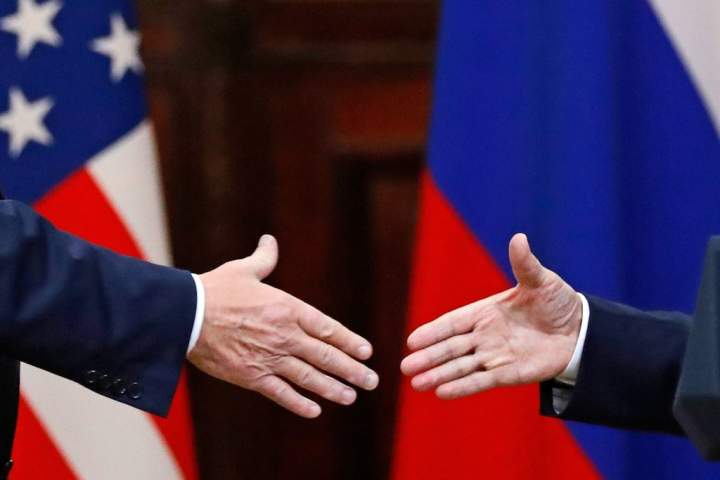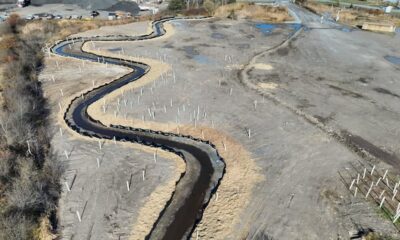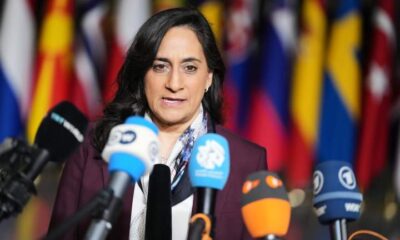World
Ukrainians in Canada Hope for Positive Outcomes from Trump-Putin Summit

Ukrainian Canadians are observing the meeting between U.S. President Donald Trump and Russian President Vladimir Putin with cautious optimism, hoping that their country’s interests will be prioritized in the discussions aimed at ending the ongoing conflict. This summit, taking place on Friday, is seen as pivotal by the Ukrainian diaspora in Canada, which is the second-largest in the world. The community has expanded significantly since Canada accepted numerous Ukrainians fleeing the full-scale invasion by Russia that began in February 2022.
While many in the community express skepticism regarding Putin’s willingness to negotiate a ceasefire or to abandon his territorial ambitions, they appreciate Canada’s role in maintaining Ukraine’s standing in international dialogues. Ihor Michalchyshyn, CEO and executive director of the Ukrainian Canadian Congress, articulated the sentiment, stating, “We’re watching this with curiosity. I think we’re going to find out, is President Trump there to be an ally of Russia or an ally of Ukraine, or some third option?”
Trump has tempered expectations for the summit. He mentioned his intention to “set the table” for a subsequent meeting that would include Ukrainian President Volodymyr Zelenskyy. His comments followed a virtual meeting on Wednesday, where European leaders, including Canadian Prime Minister Mark Carney, reaffirmed the principle that decisions regarding Ukraine’s future must be made by Ukrainians themselves.
During a call on Wednesday, Trump briefed Zelenskyy, Carney, and European leaders about the upcoming summit. He has pledged to provide updates after his discussions with Putin. Michalchyshyn expressed hope that the unified voice of Europe, Canada, and Ukraine would resonate with the American president, stating, “We hope that this will be what he takes into the meeting with the Russians, but you never know… what Putin will do in a room with Trump.”
Canada has been a staunch supporter of Ukraine since Russia’s annexation of Crimea in 2014. The support intensified after the onset of the full-scale invasion in early 2022. Under Carney’s leadership, who assumed the role of Prime Minister earlier this year, Canada has continued to reaffirm its commitment to Ukraine. At the recent G7 summit held in Alberta, Carney announced a military aid package exceeding $2 billion, derived from previously allocated funding, and supported the initial disbursement of funds sourced from frozen Russian assets for Ukraine’s reconstruction.
In discussions with Zelenskyy and British Prime Minister Keir Starmer this week, Carney reiterated that while Canada welcomes Trump’s leadership in pursuing an end to the conflict, it is imperative that Ukraine’s sovereignty and territorial integrity are preserved. Additionally, the Canadian public has shown strong support for Ukraine through humanitarian aid contributions. The Canada-Ukraine Foundation has reported sending over $95 million to Ukraine since 2022 to assist with humanitarian efforts.
Valeriy Kostyuk, the foundation’s executive director, noted a surge in support and donations this year, particularly in the wake of Trump’s previous controversial meeting with Zelenskyy in February. He observed that Trump’s threats regarding Canada potentially becoming the 51st U.S. state resonated deeply with Canadians, allowing them to relate more closely to Ukraine’s struggles that date back to 2014.
Kostyuk emphasized the ongoing mission of the foundation to reunite Ukrainian children forcibly removed by Russian forces with their families. The Canadian government is also co-leading international efforts to address this issue, as over 19,000 Ukrainian children have been relocated to Russia, often adopted by Russian families or placed in camps. Advocates argue that these actions aim to erase the children’s Ukrainian identity and prepare them for future military conscription.
The severity of Russia’s actions has drawn strong condemnation. Former Prime Minister Justin Trudeau previously accused Russia of committing acts that could be classified as genocide. Kostyuk remarked that the situation highlights the necessity for a firm stance against Putin during negotiations. At present, Russia occupies about one-fifth of Ukraine’s territory, raising concerns among Zelenskyy and European leaders that any agreement reached between Trump and Putin might solidify these territorial gains.
While Trump has acknowledged the possibility of “land-swapping” in a potential future agreement, he has also assured that he intends to reclaim some territory for Ukraine. Michalchyshyn stressed the importance of maintaining Ukraine’s territorial integrity and decision-making authority, insisting that these issues should not be compromised or negotiated away. “That’s what we’re seeing is the most essential role of European and Canadian leadership at this point,” he stated.
Zelenskyy has been vocal in opposing any discussions about ceding territory to Russia, underscoring that Ukraine’s borders are established in its constitution and that any changes would necessitate a referendum. Trump expressed some discomfort with this stance, indicating a complex dynamic in the negotiations ahead.
Kostyuk drew historical parallels to the current situation, likening Trump’s position to that of Neville Chamberlain during the prelude to World War II, where appeasement of aggressors led to greater conflict. He noted, “The sentiment from within the (Ukrainian Canadian) community has been consistent: that appeasement of the aggressor at the cost of the victim, which is Ukraine, is not going to bring a sustainable and just peace.” The community continues to advocate for justice and support for Ukraine’s sovereignty as the summit unfolds.
-

 Politics4 weeks ago
Politics4 weeks agoSecwepemc First Nation Seeks Aboriginal Title Over Kamloops Area
-

 World5 months ago
World5 months agoScientists Unearth Ancient Antarctic Ice to Unlock Climate Secrets
-

 Entertainment5 months ago
Entertainment5 months agoTrump and McCormick to Announce $70 Billion Energy Investments
-

 Science5 months ago
Science5 months agoFour Astronauts Return to Earth After International Space Station Mission
-

 Lifestyle5 months ago
Lifestyle5 months agoTransLink Launches Food Truck Program to Boost Revenue in Vancouver
-

 Technology3 months ago
Technology3 months agoApple Notes Enhances Functionality with Markdown Support in macOS 26
-

 Lifestyle3 months ago
Lifestyle3 months agoManitoba’s Burger Champion Shines Again Amid Dining Innovations
-

 Top Stories2 months ago
Top Stories2 months agoUrgent Update: Fatal Crash on Highway 99 Claims Life of Pitt Meadows Man
-

 Politics4 months ago
Politics4 months agoUkrainian Tennis Star Elina Svitolina Faces Death Threats Online
-

 Sports5 months ago
Sports5 months agoSearch Underway for Missing Hunter Amid Hokkaido Bear Emergency
-

 Politics5 months ago
Politics5 months agoCarney Engages First Nations Leaders at Development Law Summit
-

 Technology5 months ago
Technology5 months agoFrosthaven Launches Early Access on July 31, 2025




















